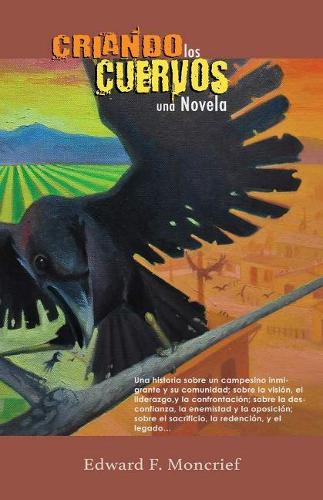
Criando Los Cuervos: Una Novela-
(Paperback)
Publishing Details
Criando Los Cuervos: Una Novela-
By (Author) Edward Moncrief
BookBaby
BookBaby
15th April 2019
United States
Classifications
General
Fiction
813.6
Physical Properties
Paperback
494
Width 139mm, Height 215mm, Spine 33mm
648g
Description
The Mexican dicho "You raise the blackbirds, and they pluck out your eyes" prompted the title of this adult literary novel, Raising the Blackbirds; the story of a Mexican migrant farmworker, Sixto Torres. The narrative follows Sixto's life as a child in San Ciro; his "coming-of-age" experiences as a student attending a Catholic seminary and his struggle to lay aside that vocation. It describes Sixto's efforts, after the death of his father, to care for his mother and siblings, his marriage to Elida, and his decision to come north and to cross the border, eventually to join the migrant trail from Texas to California. Later chapters are set in the early Seventies. As Salinas Valley farmworkers organize for better wages and greater power over their living conditions, Sixto seizes a rare opportunity to purchase and rehabilitate an abandon labor camp. He is beset by numerous political, social, and cultural divisionsinternal and externalas he leads his community in securing needed permits and financing. The housing cooperative's successful completion signals an immigrant community's transformation from a migratory and disregarded population to permanent and respected members of society.Raising the Blackbirds is carried forward over a period of forty-three years (1940 through 1983) through a narrative of three journeys: the Torres family's migration from Mexico to Texas (which occurs in Part One), the family's migration from Texas to California (which occurs in Part Two), and the family's and community's migration from squalid labor camps to decent and stable homes (which occurs in Part Three). As a community leader, Sixto must deal with jealousy, deception, suspicion, conspiracy, even persecution. Like many leaders, he sacrifices his own health and strains his relationship with Elida to follow "what he must do, his macho"; yet he is also weakened as a leader, at times, by his failure to control his temper and his drinking.Sixto constantly looks ahead to the next great challenge that, once overcome, will bring greater opportunity for himself, his family, and others around him. Although his ideals are high, he often finds himself mired in his own limitations and/or hindered by opponents who seek to gain from his achievements; yet, inexplicably, are ready to undercut him at every turn. Sixto struggles to understand his antagonists. Unable to reach accord, he takes actions that alienate them further; eventually to his own detriment. Sixto's early years in Mexico, reveal the society's wounds and scars inflicted during four-hundred-fifty years of oppression from without and within. The Mexican immigrants' journey north is not taken in isolation. It is presented as a direct product of the recurring bloodbaths: murder, disease and dislocation brought by the conquistadors, the fight for Independence from Spain, the 1846 invasion and land appropriation by the United States, and the assassinations of the young nation's leaders during the Revolutions and succeeding uprisings. The people carry this onerous history even as they seek a new life and new opportunities al norte. Sixto's fight to gain the knowledge, skills, and political power needed to bring positive change and to overcome distrust, jealousy, and opposition from some of his own community is reflective of Mexico's immigrant farmworkers' broader struggles in California and the nation. Sixto is seen as an iconic figure whose restive spirit and sometimes feverish resentment reflect social, cultural, and economic scars that were inflicted on Mexico and its people both from without and from within and that continue to affect the struggles and behavior of its sons and daughters who come north and strive to assimilate.
Author Bio
EL AUTORNacido en Los Angeles en 1942, Edward Moncrief creci en un pueblo rural de Redlands, California. Desde nio, sola ganarle al calor del verano durmiendo al aire libre. Se despertaba por las maanas, escuchando a los braceros campesinos, cantando sus alabados entre los arboles de naranjas. Dedico diez aos estudiando para ser sacerdote Franciscano, recibi conocimiento solido en las artes liberales. Durante esos aos, el desarrollo un cario por la literatura y el lenguaje Ingles. Moncrief decidi dejar sus estudios para el sacerdocio a la edad de veintitrs. El se caso con Judi Carl in 1967. El siguiente ao, entro a la escuela de posgrado donde obtuvo su grado de Maestra en Trabajo Social con nfasis en Organizacin de Comunidades y Desarrollo; despus de lo cual, primero se traslad a San Joaquin y enseguida al Valle de Salinas. Moncrief dedic cuarenta y uno aos de su profesin dirigiendo organizaciones de viviendas sin fines de lucro y desarrollando nuevas viviendas para familias de trabajadores campesinos y otras personas con desventajas econmicas. Creciendo los Cuervos esta basado en sus experiencias desarrollando viviendas para trabajadores campesinos.En 1980, fundo Community Housing Improvement Systems and Planning Association (CHISPA), una corporacin de desarrollo de viviendas sin fines de lucro con operaciones en la Costa Central de California. A lo largo de los aos, ha sido un columnista invitado y ha escrito editoriales y artculos para el Salinas Californian, el Monterey County Herald, y Western City Magazine entre otros peridicos y revistas. El tambin fue escritor contribuyente de Jill Shook's Making Housing Happen, una antologa de historias basadas en la fe de modelos de viviendas asequibles en los Estados Unidos. Mas tarde en su profesin como escritor, Moncrief fue reportero por cuenta propia para el Salinas Californian
